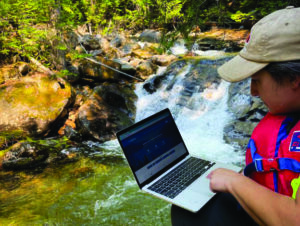
Bringing watershed data to life with new visualization tool.
On the surface, Canada appears rich in freshwater. Yet, as communities across the country continue to face increasing water scarcity, it’s clear that more water data is needed to understand and sustainably manage freshwater sources. Water data provides essential information to support local climate adaptation efforts and inform decision making on freshwater use. Safe, centralized repositories are a vital component in the water security puzzle, providing secure data storage and easy access for those who need it. Living Lakes Canada’s Columbia Basin Water Hub is specifically designed to address this need effectively.
The Water Hub brings together over 400 datasets and seven million data points from over 50 contributors. This extensive water data covers lakes, streams, wetlands, snow, glaciers, and more. The data is collected by stewardship groups, governments, consultants, and industry. As a strong regional data model within the national data landscape, the Water Hub’s success stems from meeting contributors where they’re at and providing tailored support to meet specific user needs.
Since receiving the Open Data Quality Award from the Canadian Open Data Society in 2023, the Water Hub has continued to evolve to meet the expectations of its data users and contributors. Most recently, with support from Living Lakes partner Link Digital, a global leader in CKAN and open data solutions, the Water Hub has launched an entry-level data visualization tool to better serve the data community.
Living Lakes and Link Digital are collaborating to support the development of other regional data models, including an Indigenous Knowledge and Western science portal for the Nicola Watershed Governance Partnership, a government-to- government initiative between the Five Nicola First Nations and the Province of BC. As interest in regional databases grows, communities across diverse water monitoring landscapes are increasingly embracing this model for localized water data management and stewardship. By making water data accessible, supporting Indigenous data sovereignty, responding to the needs of data contributors, and continuously improving data visualization and understanding, the Water Hub will continue to provide the foundation needed to strengthen climate resilience in communities and support the path towards a water-secure future.
The CBWMF datasets on the Columbia Basin Water Hub, now updated with 2024 data, will have the graphing tool available by the end of November 2024. Data users and contributors can expect the tool to be enabled on all datasets in early 2025.
Living Lakes Canada Living Lakes Canada acknowledges that this project is taking place in the unceded traditional territories of the Ktunaxa, Lheidli T’enneh, Secwepemc, Sinixt and Syilx Nations who have stewarded these lands for generations.
Living Lakes Canada
